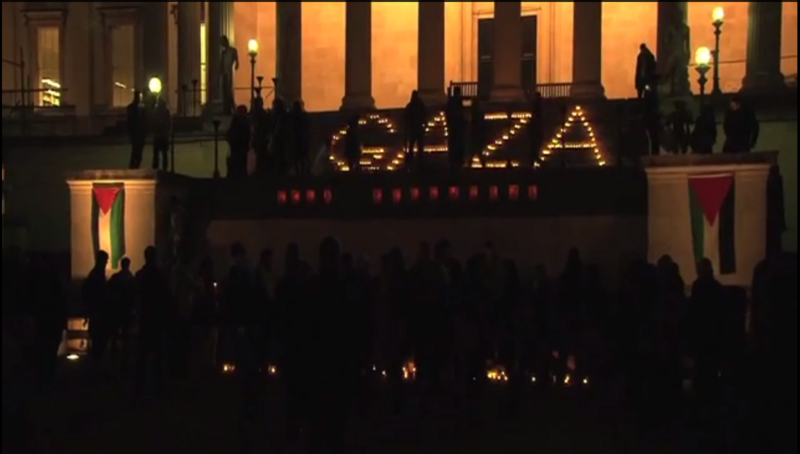Lobby Watch 2 December 2014

A 2011 candelit vigil for Gaza at University College London. (Sternchen productions)
Documents obtained by The Electronic Intifada reveal a complicated year-long attempt to undermine Palestine solidarity at the prestigious University College London (UCL) using legal threats. Also important were the support of an unidentified MP and smears about “radical Islamism.”
In December 2012 a student wrote to Malcolm Grant, then head of UCL, complaining about a campus referendum which condemned the humanitarian crisis caused by Israel’s bombing of Gaza in November that year.
Israel killed 162 Palestinians and injured more than 1,000 in the attack it code-named Operation Pillar of Defense.
Emails released by the university under the Freedom of Information Act (one is published below) redacted the name of the complainant, but she has been identified by The Electronic Intifada as Susan Storring, then a mature student in the department of Hebrew and Jewish Studies.
“How students must behave”
The emails show that Storring called on Grant to prevent students making a political stand against the Israeli onslaught, calling the motion “irrational and inflammatory.”
She said she wanted to see “the university authorities step in to explain how students must behave.”
Storring encouraged Grant to discipline students who were promoting the referendum and even suggested he threaten them with expulsion:
You are the Provost and you must act in light of your best judgement. If I were the Provost, I would call these people in and explain that their behaviour is not acceptable in a university. If it were me, I would add that if they are seen to be threatening free thinking and sections of the student body in the future, they will have to leave.
As well as suggesting that the referendum could threaten “free thinking,” she also claimed that the referendum “covertly attempts to overturn” a previous motion. The irony of the fact that she was attempting to overturn democratic student politics by eliciting the intervention of university management behind the backs of other students was apparently lost on her.
“Humiliating reputational blow”
Storring also used a second line of argument: “As we all know, UCL has already had a brush with radical Islamism.”
This was followed by explicit references to the case of Umar Farouk Abdulmutallab, a former UCL student, who was convicted of the attempted murder of 289 people for trying to blow up a plane on Christmas day 2009. She added:
you can imagine that I especially do not wish UCL to suffer the same humiliating reputational blow [redacted] as a result of mismanagement of radical islamic [sic] politics.
The Abdulmutallab case had nothing to do with Palestine and the Caldicott Inquiry in 2010 found no evidence to suggest he was “radicalized” while at university. Yet, clearly concerned, the emails show that Grant requested “a briefing” on the referendum from the students union, UCLU.
UCLU defended its independence, asserting that “it is for students to determine the remit of the Union” and not the job of the university “to step in to set the terms of the debate.”
“Radical Islamism”
Storring also said that “as a Jewish student” she felt “threatened.” She claimed that the motion was “pitting Muslim students against Jewish students.”
But UCLU rejected this accusation, pointing out that “many of the campaigners for the motion were Jewish and Israeli themselves” and also took issue with her characterization of the motion as “radical Islamic politics.”
Unable to persuade the university administration to intervene, Storring subsequently contacted UCLU in January 2013.
Documents leaked to The Electronic Intifada (one of which is published below) show that she warned the union she had taken legal advice which “indicated that implementation of this motion would probably contravene charity law.”
Her message demanded that UCLU council “must immediately and publicly annul the recent referendum” and threatened:
If UCLU Council finds itself unable, or unwilling, to do this by midnight on 31 January 2013, I will need to make a formal complaint to the Charity Commission along the lines indicated above.
The correspondence shows that she was again rebuffed. The union council told her it had no power to annul a decision made in a democratic referendum and would not try to do so.
Despite this setback, Storring persisted, attending a meeting of the union’s Trustee Board to make her case again in March 2013 — but they too chose not to overturn the referendum. Instead they offered her assistance to draft a counter-motion.
“Serious regulatory concerns”
But rather than using democratic channels, it appears Storring chose to complain next to the Charity Commission, the body which regulates UK civil society organizations, including student unions (as most are registered charities).
Remarkably, in June 2013 the publicly-funded commission wrote to the student union (this is the third document published below) about what it called potentially “serious regulatory concerns.”
As well as the referendum motion on Gaza, a “Right to Education” motion, supporting Birzeit University in the West Bank, was also included as evidence of these concerns.
In subsequent exchanges the commission alleged that the union’s independence as a charity had been “called into question” and suggested an “unbalanced and partisan” rather than “even handed and non-discriminatory” approach.
Student union officers sent at least two replies, politely accusing the commission of misunderstanding “the referenda process” and “the nature of students unions.”
The Charity Commission only closed its case file in December 2013, a year after the vote in question.
The commission has been accused of disproportionately investigating Muslim charities (many of which are actively pro-Palestinian) since the appointment of pro-Israel and Henry Jackson Society-linked figure William Shawcross as its head.
Unable to win debates
Revealingly, documents released by the Charity Commission under the Freedom of Information Act show that an MP (whose name was redacted) had also written to the regulator on behalf their constituent — almost certainly the same complainant, Storring.
This case underlines the reason universities have long been regarded as a key concern by the pro-Israel lobby: its shows that pro-Israel students at many top universities are unable to win democratically by making public arguments. Alternative behind-the-scenes strategies are instead becoming the norm.
Instead of campaigning democratically, it seems Storring went to university management and her MP, just as pro-Israel actors on US campuses are increasingly seeking to use elites to overturn democratic grassroots politics.
By seeking legal advice to threaten the students union with and eliciting the Charity Commission’s intervention she used “lawfare” tactics similar to those seen at King’s College London and elsewhere.
Finally, the use of the “radical Islamism” smear is reminiscent of the strategies of many other pro-Israel groups. Storring may have been in touch with at least one such group in the UK — though how much, if any, external assistance she had in her ultimately unsuccessful campaign to overturn the Gaza referendum remains unclear.
The Electronic Intifada wrote to Storring seeking comment but received no response.






Comments
UK lawyers for Israel
Permalink Geoffrey Cohen replied on
I think the organisation who helped in this was UK lawyers for Israel http://www.uklfi.com/. I heard a member speak at a zionist federation event over the summer, which I and some other non zionist Jews went to protest at. He talked about using this case at UCL in great detail, although was intially talking about a motion mandating the union to lobby the university to drop it's contract with Eden Springs
Good to know! Do get in touch
Permalink Hilary replied on
Good to know! Do get in touch if you have more info
The charities commission tactic has worked with RIBA
Permalink Georgina Baidoun replied on
http://www.thejc.com/news/uk-n...
"The move rescinded a motion which had been passed in March calling for Israelis to be barred from the International Union of Architects (UIA) in response to concerns about Palestinian human rights and Israeli settlement building.
Riba changed its stance after lawyers warned that such a policy was outside its charitable remit and could lead to Charity Committee censure."